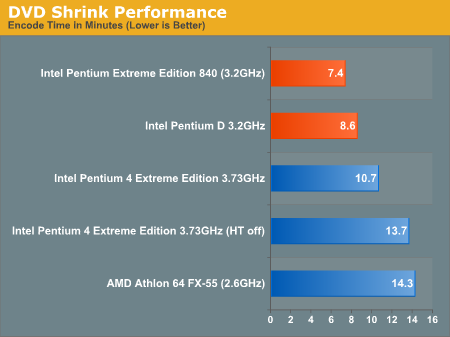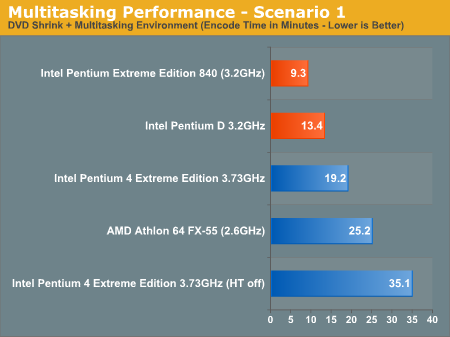Intel Dual Core Performance Preview Part I: First Encounter
by Anand Lal Shimpi on April 4, 2005 2:44 PM EST- Posted in
- CPUs
Multitasking Scenario 1: DVD Shrink
If you've ever tried to backup a DVD, you know that the process can take a long time. Just ripping the disc to your hard drive will eat up a good 20 minutes, and then there's the encoding. The encoding can easily take between 20 - 45 minutes depending on the speed of your CPU, and once you start doing other tasks in the background, you can expect those times to grow even longer.
For this test, we used DVD Shrink, one of the simplest applications available to compress and re-encode a DVD to fit on a single 4.5GB disc. We ran DVD Decrypt on the Star Wars Episode VI DVD so that we had a local copy of the DVD on our test bed hard drive (in a future version of the test, we may try to include DVD Decrypt performance in our benchmark as well). All of the DVD Shrink settings were left at default, including telling the program to assume a low priority, a setting many users check in order to be able to do other things while DVD Shrink is working.
As a single application with no multitasking involved, here's how DVD Shrink performs:

As you can see, the new dual core chips can shrink a DVD in about 70% of the time of the 3.73EE. But what happens to performance when you start doing other things in the background?
In order to find out, we did the following:
1) Open Firefox and load the following web pages in tabs (we used local copies of all of the web pages):
We kept the browser on the AT front page.
2) Open iTunes and start playing the latest album of avid AnandTech reader 50 Cent on repeat all.
3) Open Newsleecher.
4) Open DVD Shrink.
5) Login to our news server and start downloading headers for our subscribed news groups.
6) Start backup of Star Wars Episode VI - Return of the Jedi. All default settings, including low priority.
DVD Shrink was the application in focus; this matters because by default, Windows gives special scheduling priority to the application currently in the foreground (we will test what happens when it's not in the foreground later in this article). We waited until the DVD Shrink operation was complete and recorded its completion time. Below are the results:

Now, we start to see where dual core helps. In this relatively simple multitasking scenario, the DVD shrink task took more than twice as long on single core CPUs than it did on dual core chips. The Pentium 4 without Hyper Threading took a full 35 minutes to complete the task, compared to the 9.3 minutes of the dual core Pentium Extreme Edition. Even the fastest from AMD couldn't hold a candle to the dual core offerings.
And this was only with a minimal amount of multitasking. Had more applications been running or had actual user interaction taken place during the test, the dual vs. single core gap would've grown even more.










141 Comments
View All Comments
Da DvD - Wednesday, April 6, 2005 - link
Many of you are making a huge mistake. You are proposing insane multitasking tests to 'bring these processors to their knees'. This is wrong! Since when do we adjust the review to the product?This is similar to only running benchmarks whose working sets fit completely into the 2mb cache of a new cpu. In other words, when you review a product like this, do NOT suddenly change all your variables, keep them as you always had them. Later on, you can adjust variables (tests), and draw your conclusions accordingly.
Also, I hope people understand that when Anand would have run these test on a dual Xeon 3.2 system, the results would have been virtually the same. You ALREADY KNOW dual cpu systems can be twice as fast as single cpu systems in certain tests, and show no improvement at all in others.
I really appreciate the article in general, but it would have been SO much better when the PICTURE would have been complete. For this, a dual Opteron system and a dual Xeon system should have been included, AND the tests should have a reflected typical user workloads. If for some reason all cpu's would have been dualcore already, -I- still wouldn't be importing PST files while running my games. Again, when reviewing something, it's wrong to adapt the workload to the product. This is why some people now question your integrety, Anand, because quickly reading through the article DOES give the impression Dual-Core is THE thing, while there's so much it is not!
And yes, i do realize you don't have dual Opteron/Xeon rigs at hand, but still, you choose to present this incomplete picture. It was a choice, but not necessarily the correct one ;-)
Regards,
DvD
Zebo - Wednesday, April 6, 2005 - link
Anand for game marks I like to see a dvdshrink deep analysis/encode, with grabit downloading 8 threads with plenty more cued, some seti at home, then run farcry and report FPS.:DThat will bring these single procesors to thier knees obviously but I want to see if DC is really worth it since that's the type of choices I'm forced to choose between.
tjahns - Wednesday, April 6, 2005 - link
As I am not a regular reader nor familiar with the benchmarks used in this article, I am rather disappointed that the scales on the graphs in this article do not indicate what is being measured nor whether "higher is better" or "lower is better".Calin - Wednesday, April 6, 2005 - link
What would be better in games (I think), especially in first person shooter games, would be to compare the lowest frames per second, and not the highest or the averaged frame rate. And I think this would represent an tremendous advantage for multiprocessors/multicoreCalin - Wednesday, April 6, 2005 - link
"Nice article, as always. I wonder how memory bandwidth increases/decreases will effect the performance of the already bandwidth hungry intel processors."The Intel processors are no longer bandwidth hungry, as the move to the 1066FSB showed. However, throw a second processor into the mix, and things might change
Calin - Wednesday, April 6, 2005 - link
The Register has a small review on it, and compare it against a dual Xeon righttp://www.theregister.co.uk/2005/04/05/review_int...
Icehawk - Wednesday, April 6, 2005 - link
Great article - loved the multitasking benchmarks.Here's what I have running all the time:
WinAmp 5
Outlook 2003
Firefox 1.02
ICQQ2003Pro
Norton A/V2005
drivers for audio & video :)
How is my performance affected by multiple Word, Excel, Pshop CS windows? Can I game with them open or do I still need to shut everything down like on my current system? Could I encode a DVD and play a game? Play a DVD off one drive and encode off another?
As mentioned some of what I want to know is can I do things that currently require me to really run two boxes? I recently moved Azareus (torrent client) and all of my DVD encoding & burning to a second rig.
Macro2 - Wednesday, April 6, 2005 - link
No games tested at all? Since when does this happen? Intel doesn't want dual core to look bad so Anandtech doesn't bench ANY games at all.Come on guys, judging by the article below on the Inquirer I'm not the only one who is suspicious.
http://theinquirer.net/?article=22332
Same ole' same ole'
snorre - Wednesday, April 6, 2005 - link
Why did you exclude dual CPU (Opteron/Xeon) systems from your comparisons?I recommend that you guys at Anandtech read this:
http://theinquirer.net/?article=22332
Well said! ;-)
Bathrone - Tuesday, April 5, 2005 - link
What about the new extreme edition and I think WinXP only supports a maximum of two cpus? Im not keen to goto 2003 Server. What are Microsoft going to do - patch XP to support 4 cpus?